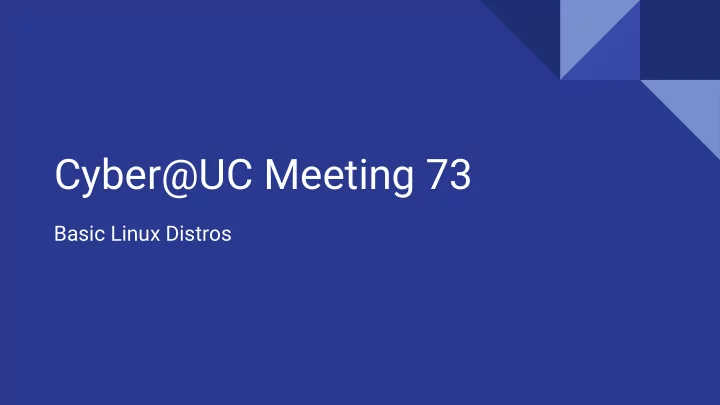

Cyber@UC Meeting 73 Basic Linux Distros
If You’re New! ● Join our Slack: cyberatuc.slack.com Check out our website: cyberatuc.org ● SIGN IN! (Slackbot will post the link in #general every Wed@6:30) ● ● Feel free to get involved with one of our committees: Content Finance Public Affairs Outreach Recruitment Ongoing work in our research lab! ●
Announcements ● NSA Internship Application window closing Oct 31st NSA Codebreaker Challenge Event ● ○ Saturday 10/20/18 ○ Hosted by Cyber@UC Positions Up For Nomination: Chipotle fundraiser ● ● President ○ Saturday Nov 3rd 4pm–8pm ● Vice President Election Nominations! ● ● Secretary ● Treasurer Northrop Grumman check ● ● Head of Public Affairs ● Cyber@UC Wiki now live! ● Head of Recruitment and Retention ● Head of Outreach ○ wiki.cyberatuc.org ● Head of Content and Information ● Head of Finance
Weekly Content
WhatsApp Video Call Compromise ● Found by Project Zero Would allow a hacker to remotely take control of your WhatsApp by video ● calling through the app ● Memory heap overflow caused by malformed RTP packets in video call requests, causing corruption error and crashes the app Affected Android and iOS apps ● PoC published detailing steps on recreation of flaw ● ● Published PoC only causes crash, but real flaw exposes much more ● Only one of about 6+ major flaws I’ve covered in WhatsApp this year alone
LoJax UEFI rootkit by Sednit APT ● UEFI rootkits considered very dangerous because they are difficult to detect and can survive most security measures, like os reinstall and hard disk replacement ● UEFI rootkits have been presented as PoC, others known to be used by government agencies First wild UEFI rootkit just found ● Sednit, is also known as APT28 or Fancy Bear: ● ○ DNC hack, TV5Monde hack, World Anti-Doping Agency email leak Called LoJax due to malicious use of LoJack anti-theft software ● ○ To protect itself against OS reinstall, implemented as UEFI module
Web Polluters: Xiongmai ● Since Mirai, in which Xiongmai was among the majority of infected devices, companies have been stepping up out of the box security Xiongmai has continually shown a preference for market share and price over ● any form of security improvements ○ Continue running devices on P2P network despite being advised against it ○ Warned by security researchers about flaws in their devices, but never made changes ○ Default username and password is admin, no password Several record breaking DDoS attacks have occured since ● ○ Multiple security firms have listed Xiongmai’s products as being major contributing factors Ex. DVR remote login bypassed through forced browsing ○ ● Xiongmai threatened to sue critics for defamation and promised to do a recall but never did either
Xiongmai (continued) ● 10s of millions of these weakly secured devices out there because Xiongmai controlls 25% of the DVR market alone Survive through not selling to customers but getting rebranded by 3rd party ● companies rebranding Xiongmai products as their own ● Not driven/pressured to improve security ●
Recommended Reading https://thehackernews.com/2018/10/android-linux-kernel-cfi.html https://thehackernews.com/2018/10/android-cloud-backup.html https://thehackernews.com/2018/10/web-browser-tls-support.html https://www.darkreading.com/operations/ibm-builds-soc-on-wheels-to-drive-cybe rsecurity-training/d/d-id/1333042 https://krebsonsecurity.com/2018/10/supply-chain-security-101-an-experts-view/
Recommended Reading (continued) https://www.welivesecurity.com/2018/10/11/new-telebots-backdoor-linking-indu stroyer-notpetya/ https://www.darkreading.com/cloud/millions-of-voter-records-found-for-sale-on-t he-dark-web/d/d-id/1333041 https://www.darkreading.com/endpoint/privacy/dod-travel-system-breach-expose d-data-of-30k-civilian-military-employees/d/d-id/1333036 https://thehackernews.com/2018/10/dark-web-drugs-kingpin.html
Linux What exactly is it?
The Topics Today Go Something Exactly Like This - What is Linux - What are distributions - Benefits to different types of distro - Remaining time spent showing off Kali tools
What is Linux ● Kernel developed in the early 90s Kernel acts as a bridge between applications and the actual data processing ● at the hardware level, manages system resources and communication ● What you think of as linux is actually an OS developed around that kernel ● Developed to be an open source alternative to Unix Linux is in basically every device that isn’t a pc ●
How is it different from Windows and Mac ● Linux is free and open sourced Windows and Mac are more standardized into single versions ● ○ Linux is distributed into many distributions that are very different ● Linux and OS X are both Unix variants, but Windows is not, only unix similar Linux is dominant in terms on general computers, but Windows is dominant in ● personal/desktop computers
How is it different from Unix? ● Linux is a Unix-like OS Unix was developed by AT&T in late 60s to be a multi-tasking, multi-user os ● Written on C language allowing it to run on many hardware architectures ● ● Unix was not open source ● Linux was born in the early 90s to be a free open source alternative to unix For a user, there is little difference ● Unlike linux, Unix has several different versions of kernel ●
What are distributions and families? ● Linux Distribution: OS made from a software collection based on the Linux kernel and a package management system Organized into major families by major distro and package manager ● ● RPM: Red Hat, SUSE, CentOS, Fedora ● Debian: Ubuntu, most other Linux OS Pacman: Arch, Manjaro ● Gentoo: Chromium ● ● Slackware: Freenix, DNALinux, Linux From Scratch ● Independent: Android Primarily RPM and Debian ●
Popular distros and their uses
Tried and True (normal/standard) ● Ubuntu: based on debian, tries to be more user/beginner friendly Debian: slower releases, broken into stable and unstable builds ● Fedora: frequent releases, less stable, but more up-to-date w/ new tech ● CentOS: more stable, but less frequent releases ● Arch: Less configured than other systems, helps with in-depth knowledge, ● fosters deep knowledge about your packages, for advanced users willing to see their stuff break all the time
Easy to Use ● Mint: works similarly to Windows Elementary: visually, very similar to Mac ● Ubuntu: does kind of fit between this category and the last ●
Serving a use case ● OpenBSD: security, considered one of if not the most secure os Kali: penetration testing and other similar tools ● Lubuntu: light weight, lots of distros work for this, like, soooo many ●
Put on your 3D glasses Linux Distro now
Recommend
More recommend